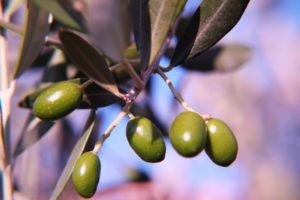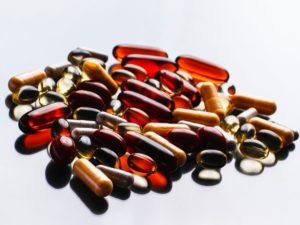Modified Citrus Pectin

Modified citrus pectin is a compound that comes from citrus fruits, like oranges, lemons, grapefruit and limes. The white pithy part of the citrus peel contains large amounts of indigestible fiber. By treating this fiber with heat, acid or alkaline chemicals and enzymes the pith can be broken down into smaller fragments. Once broken down, the fiber is referred to as modified citrus pectin, a form that can be absorbed from the small intestine with potential health effects.
Once modified, citrus pectin can have the ability to block a specific receptor inside the body: galectin-3. Galectin-3 is a compound that has been shown to affect numerous functions. Levels of galectin-3 are known to have correlations with cancer, inflammation, autoimmune disease, heart disease and dementia (Hara 2020). As such, it shouldn’t be too surprising that modified citrus pectin has been explored for use in cancer treatment, heart disease, inflammation and heavy metal toxicity.
Modified Citrus Pectin and Cancer
Probably the most well-known potential indication for modified citrus pectin is cancer. The reason cancer is often fatal is due to metastasis. Metastasis is the process whereby cancer cells spread and grow in new locations throughout the body. If metastasis is blocked, cancer can be contained and may become a manageable condition.
Modified citrus pectin blocks several critical steps in the metastasis process, potentially helping to prevent cancer spread (Eliaz 2019). As such, it has been utilized in clinical trials exploring its benefits for cancer therapy, with most studies focused on prostate cancer in men.
Prostate Cancer
In patients with prostate cancer, prostate specific antigen (PSA) is measured on a regular basis. Generally, as prostate cancer worsens, PSA levels rise. In a small pilot study, ten men with prostate cancer were tracked over one year with modified citrus pectin supplementation. Of the ten men, seven slowed the rate of PSA increases over the course of the study. The findings suggest that modified citrus pectin may slow the growth of prostate cancer, which might potentially extend life (Guess 2003).
A larger study in prostate cancer relapse patients also showed benefits. In patients supplemented with modified citrus pectin, 76% had no cancer progression by six months. Of the patients who appeared to have stabilized, 59% had no change or decreasing PSA levels. The authors concluded that modified citrus pectin appeared to be beneficial on relapsed prostate cancer (Keizman 2019).
Advanced Solid Tumors
A pilot study on advanced solid tumors also found modest benefits with supplementing modified citrus pectin. After two months, 20% of patients had an increased quality of life or clinical improvements (Azemar 2007).
While the findings of the effects of modified citrus pectin on cancer are interesting, the trial results are by no means robust. Additional studies are needed to better understand modified citrus pectin as a potential cancer therapy when combined with conventional and other integrative treatments.
Heavy Metal Toxicity
Interestingly, modified citrus pectin appears to have chelating potential. Chelation is the process of binding to a metal tightly, allowing the metal to be carried out of the body. Preliminary studies on modified citrus pectin look promising. A pilot study in healthy individuals found that urinary excretion of arsenic increased 130% within 24 hours of modified citrus pectin supplementation. On day six, the levels of cadmium excretion in the urine jumped 150%, while lead increased by 560% (Eliaz 2006). The same research group reported clinical benefits using modified citrus pectin to remove heavy metals and other toxicants from five patients in published case reports (Eliaz 2007). A clinical study in China of pediatric patients with high-blood lead levels found that modified citrus pectin was able to decrease blood lead levels over the course of one month (Zhao 2008).
While these results all sound promising, it’s worth noting that all three studies had financial conflicts of interest. The main author holds a patent on modified citrus pectin for different treatments and has obvious financial motivations to find beneficial results. Additionally, the study in China had no control group and did not appear to have an Institutional Review Board review, something that is required to conduct safe human research (Crinnion 2008). It’s likely worth being skeptical over the findings on modified citrus pectin and heavy metal chelation without further, independent clinical trials verifying these results.
Heart Failure

Heart failure often results from scarring of the heart muscle that interferes with its ability to pump blood. Animal studies appear to suggest benefits for reducing fibrosis or scarring of heart muscle with modified citrus pectin (Xu 2020). A trial in humans with hypertension, however, failed to find benefits with supplementation (Lau 2021). While disappointing, the authors suggest further study is warranted.
Knee Arthritis
Similar to heart failure, animal studies also suggest potential benefits of modified citrus pectin on arthritis (Zhang 2022). Yet a human clinical trial using modified citrus pectin failed to find any benefits over placebo during the three month study (Andrews 2019).
Conclusion
While the data on modified citrus pectin for cancer is intriguing, it’s not definitive. It might be beneficial when combined with a more comprehensive treatment approach, but more research is needed to know for sure. Other areas of treatment with modified citrus pectin may also hold promise, but the published clinical trials are either potentially biased, or failed to find actual benefits. Overall, more research is needed.



